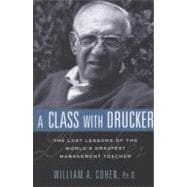
Note: Supplemental materials are not guaranteed with Rental or Used book purchases.
Purchase Benefits
What is included with this book?
WILLIAM A. COHEN, PH.D. (Pasadena, CA) is an authority on leadership and strategy
formulation and deployment. He is the author of many books including The New Art
of the Leader, The Wisdom of the Generals, and How to Make It Big as a Consultant
(978-0-8144-7073-2).
| Acknowledgments and Dedication | p. vii |
| What Peter Drucker Wrote About Bill Cohen | p. viii |
| Foreword by Ira Jackson | p. ix |
| Introduction | p. xiii |
| How I Became the Student of the Father of Modern Management | p. 1 |
| Drucker in the Classroom | p. 11 |
| What Everybody Knows Is Frequently Wrong | p. 19 |
| Self-Confidence Must Be Built Step-by-Step | p. 30 |
| If You Keep Doing What Worked in the Past You're Going to Fail | p. 44 |
| Approach Problems with Your Ignorance-Not Your Experience | p. 57 |
| Develop Expertise Outside Your Field to Be an Effective Manager | p. 69 |
| Outstanding Performance Is Inconsistent with Fear of Failure | p. 82 |
| The Objective of Marketing Is to Make Selling Unnecessary | p. 96 |
| Ethics, Honor, Integrity and the Law | p. 108 |
| You Can't Predict the Future, But You Can Create It | p. 121 |
| We're All Accountable | p. 133 |
| You Must Know Your People to Lead Them | p. 147 |
| People Have No Limits, Even After Failure | p. 160 |
| A Model Organization That Drucker Greatly Admired | p. 173 |
| The Management Control Panel | p. 189 |
| Base Your Strategy on the Situation, Not on a Formula | p. 201 |
| How to Motivate the Knowledge Worker | p. 215 |
| Drucker's Principles of Self-Development | p. 231 |
| Afterword | p. 246 |
| Notes | p. 249 |
| Books by and About Peter Drucker | p. 252 |
| Index | p. 253 |
| Table of Contents provided by Ingram. All Rights Reserved. |
The New copy of this book will include any supplemental materials advertised. Please check the title of the book to determine if it should include any access cards, study guides, lab manuals, CDs, etc.
The Used, Rental and eBook copies of this book are not guaranteed to include any supplemental materials. Typically, only the book itself is included. This is true even if the title states it includes any access cards, study guides, lab manuals, CDs, etc.